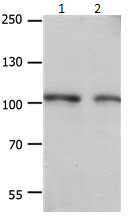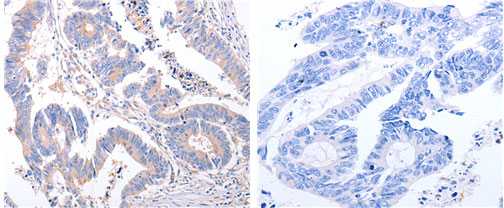

| WB | 咨询技术 | Human,Mouse,Rat |
| IF | 咨询技术 | Human,Mouse,Rat |
| IHC | 1/10-1/50 | Human,Mouse,Rat |
| ICC | 技术咨询 | Human,Mouse,Rat |
| FCM | 咨询技术 | Human,Mouse,Rat |
| Elisa | 1/500-1/5000 | Human,Mouse,Rat |
| Aliases | Eukaryotic translation initiation factor 4 gamma 2, P97, AAG1, DAP5, NAT1 |
| Entrez GeneID | 1982; |
| WB Predicted band size | 102kDa |
| Host/Isotype | Rabbit IgG |
| Antibody Type | Primary antibody |
| Storage | Store at 4°C short term. Aliquot and store at -20°C long term. Avoid freeze/thaw cycles. |
| Species Reactivity | Human,Mouse |
| Immunogen | Synthetic peptide corresponding to a region derived from 796-812 amino acids of Human Eukaryotic translation initiation factor 4 gamma 2 |
| Formulation | Purified antibody in PBS with 0.05% sodium azide. |
+ +
以下是关于EIF4G2抗体的3篇参考文献及其简要摘要:
---
1. **文献名称**:*EIF4G2 suppresses stress granule formation and regulates apoptosis under cellular stress*
**作者**:Li Y, et al.
**摘要**:该研究通过Western blot和免疫荧光技术(使用EIF4G2特异性抗体)发现,EIF4G2通过抑制应激颗粒的形成调控细胞在氧化应激下的存活,其缺失导致细胞凋亡增加。
---
2. **文献名称**:*DAP5 (EIF4G2) promotes IRES-driven translation of cellular proteins in colorectal cancer*
**作者**:Marash L, et al.
**摘要**:研究利用EIF4G2抗体验证其在结直肠癌中的表达,发现EIF4G2通过增强内部核糖体进入位点(IRES)介导的翻译,促进肿瘤细胞增殖和转移。
---
3. **文献名称**:*Interaction between EIF4G2 and viral protease modulates picornavirus replication*
**作者**:Bonderoff JM, et al.
**摘要**:该文献通过免疫共沉淀(使用EIF4G2抗体)揭示EIF4G2与小核糖核酸病毒蛋白酶的直接结合,抑制宿主翻译机制并促进病毒蛋白的优先合成。
---
以上研究均通过特异性EIF4G2抗体验证其在翻译调控、疾病或病毒-宿主互作中的功能。如需具体文献来源(期刊、年份),可进一步补充。
The eukaryotic translation initiation factor 4 gamma 2 (EIF4G2), also known as p97 or DAP5. is a member of the eIF4G family that plays a critical role in cap-independent translation initiation. Unlike its paralog eIF4G1. which supports canonical cap-dependent translation, EIF4G2 functions as an alternative scaffold protein under stress conditions, such as endoplasmic reticulum stress or viral infection. It facilitates the recruitment of ribosomes to internal ribosome entry sites (IRES) in specific mRNAs, enabling the synthesis of pro-survival or apoptosis-related proteins when cap-dependent translation is inhibited. EIF4G2 is implicated in cellular processes like differentiation, cell cycle regulation, and stress adaptation, with dysregulation linked to cancer progression and neurodegenerative diseases.
Antibodies targeting EIF4G2 are essential tools for studying its expression, localization, and interactions. They are widely used in techniques like Western blotting, immunoprecipitation, and immunofluorescence to explore its role in stress responses, viral replication, and tumorigenesis. Research using these antibodies has revealed context-dependent functions, as EIF4G2 may promote either cell survival or apoptosis depending on cellular conditions. Challenges remain in distinguishing EIF4G2 from other eIF4G isoforms due to structural similarities, necessitating antibody validation for specificity. Such studies continue to clarify EIF4G2's dual roles in health and disease.
×